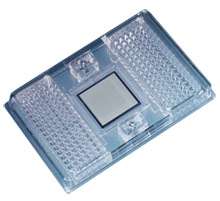October 6, 2009 weblog
Prostate Cancer Treated Using Microfluidics Technology

Credit: Fluidigm Corp.
(PhysOrg.com) -- By analyzing rare tumor cells in patient's blood, using a special microchip, doctors would be able to predict how a patient will respond to drug treatment. By using microfluidics technology rare cancer cells can be isolated (Fluidigm Chip) and minuscule changes identified in gene expression.
A trial study is being conducted, at Memorial Sloan-Kettering Cancer Center, on men with difficult to treat prostrate cancer that has not responded to other treatment. Detecting changes in gene expression will help determine whether a specific drug will be more effective.
Martin Fleisher who is chairman of the Department of Clinical Laboratories at Sloan-Kettering stated: "We want to know why they don't respond to therapy and what therapies would be best for them. We collect tumor cells from blood, and do a gene analysis to find out what genes are over-expressed and whether or not they would be candidates for certain types of targeted therapies that would beat down their cancer."
There are three main challenges when analyzing tumor cells in patient's blood. First, tumor cells can only be found in very low concentrations in the blood (approximately 1 in 10 million cells). Second, the small numbers of cells must be analyzed in very low volumes. Third, rather than detecting a specific genetic mutation, differences in gene expression must be detected.
Scientists can also use microfluidics technology to examine other properties of tumor cells. For example, looking for changes in gene expression might suggest cancer has metastasized or a tumor has mutated that makes it non responsive to specific drugs.
Via: Technology Review
© 2009 PhysOrg.com















